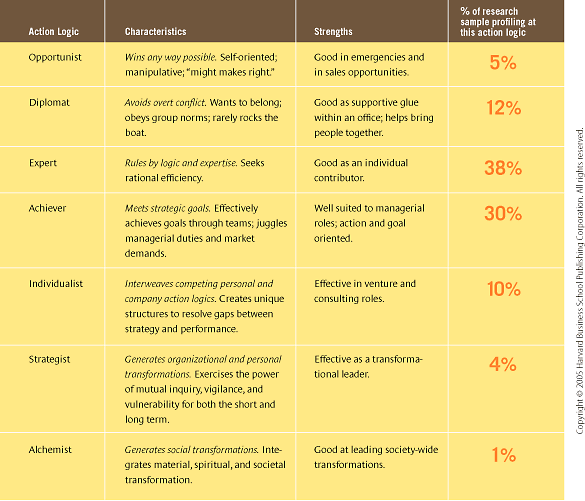| “The whole point of being alive is to evolve into the complete person you were intended to be.”–Oprah Winfrey, O Magazine |
When leaders develop coaching skills they are progressing towards a higher-level leadership style which will lead to greater effectiveness in innovating and transforming organizations. Do you believe this statement? Intuitively I believe it to be correct. Many organizations are acting on this premise as they invest in developing coaching skills in senior managers. I’ve also seen several managers gain new levels of confidence and influence through using coaching skills. Now I’ve found a body of research and a model of leadership development that further substantiate the value of coaching skills for leaders.
The Seven Transformations of Leadership
Through extensive research in organizations, David Rooke and William R. Torbert have created a model to differentiate the developmental levels of leaders. The system identifies seven levels of leadership with progressively higher levels of ability to lead and transform organizations. The system is based on the leaders ‘action logic’, that is the way they interpret their surroundings and react when their power or safety is challenged. The research shows that leaders can develop over time to greater effectiveness and that they generally follow the stages described in the Seven Transformations.
For this article, we’ll focus on the two major transformations that leaders make as they develop from an expert individual performer (Expert), to a skilled manager (Achiever), to an organizational innovator (Individualist). The first of these transformations, from Expert to Achiever, is a major bottleneck in management development and the primary focus of most management development programs. The second of these transformations requires a completely different type of development. According to Rooke and Torbert, very few organizations and business schools effectively support, recognize and actively develop leaders to the Individualist level and beyond. The Individualist level is the first level to require high-level coaching skills, deeper self-awareness and greater awareness of different worldviews.
These Action Logics reveal many insights about the development and effectiveness of leaders. It’s useful to reflect on our own development as leaders to recall if we have passed through these levels and to guess which level we currently use.
From Expert to Achiever
On reflection, most leaders would probably admit to a time in their careers when they acted mainly as experts, focusing on knowledge and influencing their team members and colleagues largely by presenting hard data and logic. Indeed the research shows that almost 40% of managers operate at this level. Experts can be excellent individual performers but since they tend to ignore the thoughts and feelings of others, they have difficulty collaborating and motivating teams.
Most management development programs focus on developing Experts into Achievers. They use training programs related to goal setting, delegation and the like to help managers learn to use flexible strategies rather than the “one size fits all” approach of the Expert. This transformation from Expert to Achiever is commonly observed in organizations and is one of the most important stages for leadership development. Managers who behave as Achievers are highly valued in organizations for their ability to achieve results though people. The research shows that 30% of managers operate as Achievers. Much less effort is made in developing leaders beyond this point.
From Achiever to Individualist and Beyond
Rooke and Torbert’s research shows that while Achievers are adept at implementing organizational strategies, Individualists and the levels beyond show the consistent capacity to innovate and to successfully transform organizations. These are the capabilities organizations crave in these days of constant change.
Unlike Achievers, Individualists are aware of the possible conflicts between principles and actions and they have a greater perspective on different personalities, values and principles between individuals and organizations. This awareness creates tension, creativity and a growing desire for further development. Individualists are more likely to ignore rules and provoke “out of the box” thinking. Individualists make excellent consultants because they operate with a wider perspective of values and are able to integrate a broader scope of needs and world views between individuals, organizations and themselves.
Also, developing as an Individualist is a necessary step towards the next transformation of thinking like a Strategist. While Individualists have mastered communication with colleagues, Strategists focus on organizational perceptions. They are adept at creating shared visions and they believe that organizational constraints and perceptions are discussable and transformable. 80% of all Strategists surveyed were at senior management positions, suggesting that managers who develop the more effective action logics, have a better chance of being promoted.
Only 15% of managers are rated as Individualists or higher, so these are quite rare qualities possessed by the world’s most successful leaders. The good news is that they can be developed over time through continued engagement.
How Coaching Skills Develop Individualists
The key difference between Achievers and Individualists is that Individualists have a deeper self-awareness and greater appreciation of different worldviews. Is this what coaching skills teach?
Many of my coaching students have remarked that they thought learning coaching would mean mainly developing their communication skills. They have discovered during the process that in order to be effective coaches they must explore themselves and be much more open to others. In fact this type of personal development is critical for coaches to be effective. Coaches must be aware of the internal barriers they erect to protect themselves from feelings or failures that they are exposed to through their coachees. And coaches need to be non-judgmental so that they can be open to whatever their coachees say. Therefore developing the ability to coach covers the same ground required to develop Achievers into Individualists and beyond.
This type of personal development of leaders could be seen as more risky for organizations because of the wider perspective that is required. After all, most companies are run by Achievers or even Experts who may not appreciate the Individualist’s perspective. Individualists are much more likely to propose solutions that go against the company-line. They are more likely to see conflicts, (and opportunities) that require change, and to push for the necessary development. At the same time Individualists have the insight to mediate between leaders at other developmental levels.
The broader, more encompassing thinking of Individualists and Strategists is what is needed to keep pace with the changes in business and society. Learning and practicing coaching is a key strategy for opening your perspective and deepening your understanding such that you can be on the cutting edge of society’s transformation. Organizations who support their leaders to explore and develop their action logics will reap rich rewards.
How will you evolve as a leader in 2006?


Trackbacks/Pingbacks